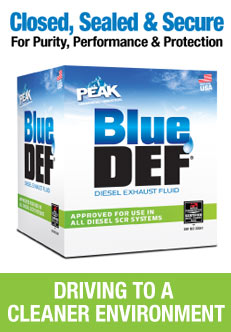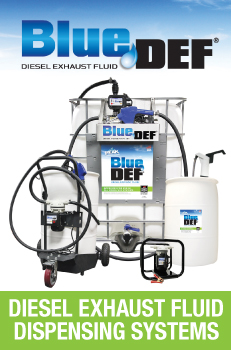Frequently Asked Questions
BlueDEF is the fluid (known as Diesel Exhaust Fluid) that is used in Selective Catalytic Reduction (SCR) systems on diesel engines to reduce NOx.
SCR is an acronym for Selective Catalytic Reduction. SCR is a technology that uses a urea based diesel exhaust fluid (DEF) and a catalytic converter to significantly reduce oxides of nitrogen (NOx) emissions. SCR is being used by almost all OEM manufacturers.
The purpose of the SCR system is to reduce levels of NOx (oxides of nitrogen emitted from engines) that are harmful to our health and the environment. SCR is the after treatment technology that treats exhaust gas downstream of the engine. Small quantities of diesel exhaust fluid (DEF) are injected into the exhaust upstream of a catalyst, where it vaporizes and decomposes to form ammonia and carbon dioxide. The ammonia (NH3) is the desired product, which in conjunction to the SCR catalyst, converts the NOx to harmless nitrogen (N2) and water (H2O).
When used in an SCR system BlueDEF will reduce the levels of NOx emissions of those engines.
BlueDEF is a high-purity, 32.5 strength urea solution and deionizer water.
Urea is a compound of nitrogen whose aqueous solution generates ammonia when heated. It is used in a variety of industries, including as a fertilizer in agriculture.
The 32.5% urea concentration is the lowest freezing point for water urea solutions. Thus, the SCR systems will be calibrated to the 32.5% solution, so that optimum NOx will be reduced during operation.
A 32.5% solution of DEF will begin to crystallize and freeze at 12 deg F (-11 deg C). Freezing does not harm the quality of the DEF solution. Upon thawing, DEF will perform as required.
During vehicle operation, SCR systems are designed to provide heating for the DEF tank and supply lines. If DEF freezes when the vehicle is shut down, start up and normal operation of the vehicle will not be inhibited. The SCR heating system is designed to quickly return the DEF to liquid form and the operation of the vehicle will not be affected.
Yes, DEF expands by approximately 7% when frozen. DEF packaging and tanks are designed to allow for expansion.
Yes, DEF needs to meet the ISO 22241 quality standard.
No, BlueDEF is classified as non-hazardous, non-toxic or flammable.
DEF is corrosive to copper, brass, and aluminum as well as carbon steel. Only approved materials as listed in the ISO 22241 standards should be used in contact with DEF.
The EPA has mandated the reduction of NOx emissions released into the environment. In particular, the new 2010 requirements.
BlueDEF is stored in a designated tank on the vehicle. It is then replenished like fuel.
Vehicles will be equipped with a DEF gauge on the dash to alert the driver on the fluid level. If the level becomes low an alert will let the driver know the DEF level needs to be replenished. If the driver runs out completely the vehicle power will be reduced to encourage the operator to refill the DEF tank. Once the DEF tank is refilled, normal power levels will be restored on the vehicle.
No, It is not an additive. It is sprayed into the exhaust stream where it reacts with the NOx in the SCR system to form nitrogen and water.
DEF is consumed at a rate of approximately 2-3% by volume to diesel consumption.
es, we offer a full line of dispensing solutions for fleets, truck stops and all other end users.
GENERAL MOTORS: 2010-2011 Chevy Silverado 6.6L Turbo Diesel and GMC Sierra 6.6L Turbo Diesel
- TSB/Campaign Number 11183B — Some Silverado and Sierra HD vehicles may experience SCR issues, especially at colder temperatures, where a MIL will be displayed. Corrective action is to install a shield and insulator to the DEF tank.
- TSB/Campaign Number 11326 — Some Silverado and Sierra HD vehicles may experience SCR issues involving DEF tanks that were built with low internal resistance, causing DTC codes P21AB, P203D or P21BO. Corrective action would be to perform campaign 11183B and if problem is not corrected, replacement of entire DEF tank would be necessary.
- TSB/Campaign Number 11001 — Some Silverado and Sierra HD vehicles may experience SCR issues where the DEF system may not operate as intended. MIL will indicate, DEF system warning will display and vehicle speed may be limited. No codes in particular are identified, but GM calls for ECM reprogramming per campaign with new software in the event of an SCR system issue.
FORD: 2011-12 F-350 Powerstroke 6.7L Turbo Diesel
- TSB/Campaign Number 11.11.13 — Some F-Super Duty vehicles with 6.7L engines built on or before 10/11/2011 may have a MIL with codes P207F, P2OEE, P2200, P2201, P2209, P164A, P2A00 and/or P0133. Corrective action would be to replace the NOx sensor with an updated component, reprogram PCM to latest calibration and reset/clear the NOx sensor adaptive learn tables.
- TSB/Campaign Number 12.3.5 — Some F-Super Duty vehicles with 6.7L engines built on or before 1/30/2012 may exhibit P204F DTC with DEF system fault warning on dash. Resolution for issue would be to recalibrate PCM with latest software.
VOLKSWAGEN/AUDI: 2011 Toureg 3.0 Diesel Turbo
- TSB/Campaign Number 26 12 01 — Some Toureg vehicles equipped with diesel engines may have MIL on with P20E8, P20B1, P202A stored in ECM. This is caused from an under voltage condition in the AdBlue control module. However, this condition does not refer to fluid quality issue.
MERCEDES-BENZ: 2009-11 GL 350 3.0 Turbo Diesel
- TSB/Campaign Number 2010110005 — Some ML 350 vehicles may exhibit an issue with changes in resistance in the AdBlue tank heater lines and may lead to fault entries 54 922 06 8 and 54 922 06 8. The corrective action for this problem would be to update the SCR module software.
DODGE: 2011 Ram Trucks 6.7L Turbo Diesel
- TSB/Campaign Number 25-002-10 — Some 2011 Dodge Ram Turbo Diesels may have a code P205B stored in the ECM as well as a lit MIL on the dashboard. Dodge has found that certain vehicles manufactured between March 3, 2010 and July 19, 2010 may have been built with a DEF engine coolant control valve that was internally misassembled. Under this condition the valve will not be able to completely shut off the flow of coolant through the tubes in the DEF tank, causing the DEF temperature to rise above its normal operating range and eventually degrade.

90 East Hawthorne Avenue, Valley Stream, New York 11580
CALL US: (516) 825-5544 • Fax: (516) 568-1937 • info@bluedef4you.com





